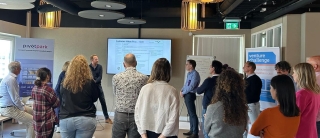These are the Venture Challenge Spring 2025 teams!
Five teams have started the Venture Challenge Spring edition 2025! These starting life sciences entrepreneurs will learn everything about building and pitching a business plan. By participating in the Venture Challenge, the teams will get a huge boost to take their idea to the next level. Not only will they receive one-on-one coaching, but they will also get the chance to pitch to investors and get in touch with seasoned entrepreneurs. Meet the five teams below!
IMPACT - Regenerative cartilage cell therapy in a single surgery

From left to right: Joost van Duijn, Jasmijn Korpershoek, Naya Moutsatsau and Maaike Braham (not on the photo)
Articular cartilage is essential for smooth, pain-free joint movement, yet once damaged it cannot repair itself. Untreated cartilage defects often progress into osteoarthritis, causing chronic pain, swelling and loss of mobility.
IMPACT, a regenerative treatment developed at UMC Utrecht, tackles this problem in one operating-room session. During surgery, a small biopsy is taken, the patient’s cartilage cells are isolated on the spot and blended with ready-to-use donor cells, and the cell mixture is re-implanted—all in about three hours. This streamlined, single-procedure approach eliminates the labour-intensive, multi-stage manufacturing found in current cell therapies.
Phase I/II trials have demonstrated IMPACT’s safety and durable efficacy for up to five years, and interim results from an ongoing Phase III trial are equally promising. For patients, the one-time surgery speeds up rehabilitation and lowers infection risk. For hospitals, it reduces operating-room time and overall costs, freeing capacity for other procedures.
The new venture will licence UMC Utrecht’s intellectual property and guide IMPACT through regulatory approval towards broad clinical adoption.
Streasure4Health - Streasure4Health revolutionizes Healthcare

From left to right: Peter Deen and Peter Voshol (Paul van de Wiel not in the photo)
Post-acute infection syndromes (PAIS), such as Long Covid and ME/CFS, are difficult to diagnose and treat effectively. Their underlying mechanisms are still not well understood, and patients often experience long diagnostic journeys, ineffective therapies, and a reduced quality of life—especially when symptoms like post-exertional malaise (PEM) are not properly addressed.
Streasure4Health is an early-stage medtech start-up working to bring clarity to the diagnosis and treatment of PAIS. The team combines unique expertise in metabolic stress with a deep understanding of the condition’s complexity. Their goal is to develop the first unifying biochemical diagnosis and point-of-care prick sensor that can objectively measure both physical and mental resilience in patients.
With this technology, clinicians will be able to personalise treatment decisions—such as whether to prescribe graded exercise therapy (GET) or pacing—and track therapy effectiveness in real time. Streasure4Health is now working to translate this innovation toward clinical application.
NeuroNova Therapeutics - Pioneering tomorrow’s potential today.

From left to right: Eva van Ingen, Cora Nijboer, Manon Benders, Daniëlle Counotte
Each year, newborns can suffer serious brain injuries due to a perinatal stroke or lack of oxygen during birth. These early life injuries can lead to long-term effects such as cerebral palsy, a condition associated with motor impairments and spasticity. Currently, no effective treatment exists to repair this damage.
NeuroNova Therapeutics is an early-stage venture working to change that. Built on 15 years of research at UMC Utrecht, the team is developing a stem cell therapy administered via nasal drops shortly after birth. The therapy uses mesenchymal stem cells from healthy donors and has already shown safety and feasibility in a phase 1 clinical study involving ten infants.
With support from a "Veelbelovende Zorg" grant, NeuroNova is now preparing for a phase 2 trial to evaluate the therapy’s efficacy. At the same time, the team is working to bring this advanced therapy medicinal product (ATMP) closer to the clinic—aiming to improve outcomes for children and families affected by early brain injury.
Matriarch: Unlocking the full potential of organoid growth

From left to right: Jorrit Achterberg, Hessel van der Weide
Organoids—3D stem cell cultures that mimic the structure and function of real organs—are transforming biomedical research, drug development, and precision medicine. However, their growth depends on a hydrogel matrix that is still widely produced using mouse-derived tumour cells. This process is costly, ethically problematic, and leads to inconsistent results due to batch-to-batch variation.
Matriarch is an early-stage venture from Erasmus MC developing a cost-effective, animal-friendly, and eco-friendly alternative. Their hydrogel is produced using waste products from fetal calf serum production and has shown to be superior across all relevant criteria for culturing organoids. It offers researchers a reproducible and scalable material without the ethical concerns of current products.
Now participating in the Venture Challenge, the Matriarch team is taking the first steps toward commercialisation. With their technology, they aim to support a growing global demand for organoid research tools—offering a more consistent, sustainable, and humane solution for the future of biomedical science.
Voyagen: Transforming drug discovery by decoding unseen pathways

From left to right: Lucia Barbadilla Martinez, Minh Chau Luong Boi, Max Trauernicht, Yuva Oz
Cancer’s biological complexity often prevents promising therapies from reaching patients. Hidden signaling interactions and regulatory mechanisms can go undetected with traditional tools—slowing down drug development and lowering success rates.
Voyagen is an early-stage venture working to address this challenge through an integrated platform that brings together two technologies: primeTF, a high-throughput tool for mapping signaling pathways using optimized genetic sensors, and PARM, an AI-driven system that provides deep insights into gene regulation.
By combining these methods, Voyagen offers a powerful new approach to understanding drug action at a mechanistic level. This enables better candidate selection, more precise targeting, and the potential for higher clinical success in cancer drug development.
Now participating in the Venture Challenge, the Voyagen team is exploring the path from cutting-edge research to commercial application—paving the way for more effective and personalised cancer therapies.
